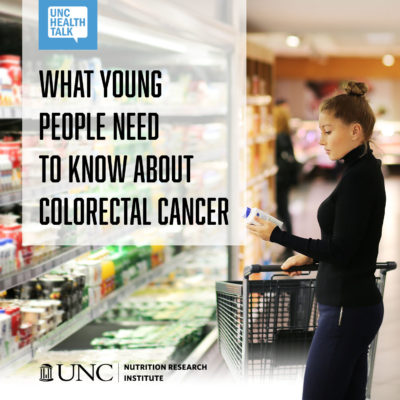First, the good news: The rates of colorectal cancer (cancers of the colon and rectum) have been declining over the past 40 years, thanks to regular screenings and lifestyle choices such as healthy eating, staying active and avoiding smoking.
Now, the bad news: While the incidence of colorectal cancer is declining overall, it is not declining for everyone. For people younger than 55, the rates of colorectal cancer have actually increased 1 to 2 percent per year since the mid-1990s.
“The majority of colorectal cancer patients are still over the age of 50,” says UNC Health surgical oncologist Karyn Stitzenberg, MD. “These young patients are a small proportion, but it’s been steadily growing over the last decades.”
We spoke to Dr. Stitzenberg and UNC Health gastroenterologist Silpa Yalamanchili, MD, about what young people should know about this troubling trend.
Reasons for the Rise of Colorectal Cancer in Young People
One of the strongest risk factors for colorectal cancer is a family history of the disease, but that’s not holding true for many younger patients.
“The majority of younger patients don’t have genetic risk factors,” Dr. Stitzenberg says. “With the absence of those genetic factors, we suspect it’s something to do with environmental exposures, such as diet, but there’s not a clear picture yet.”
According to Dr. Yalamanchili, there are several possible factors, and it’s likely a combination of these reasons.
“The leading theory links increased colon cancer rates to diets with high ingestion of ultraprocessed foods and meats and low in fiber,” Dr. Yalamanchili says. “Smoking, vaping and environmental exposures to pesticides or chemicals in foods are also being studied as causes.”
Colorectal Cancer Symptoms to Know
You should see your doctor if you notice persistent rectal bleeding, any change in bowel habits (particularly new constipation), unexplained weight loss, abdominal pain or anemia.
“The problem is that most of these symptoms can be attributed to benign conditions including irritable bowel or hemorrhoids,” Dr. Stitzenberg says. “Hemorrhoids are more common than colorectal cancer, so you don’t need to panic at a spot of blood, but when rectal bleeding is continued or persistent, it needs evaluation and a physical workup, including a rectal exam.”
Fortunately, more providers and patients are becoming aware of the rise of colorectal cancer in younger people, meaning you may not have to push as hard to receive a full workup or a referral for early screening compared to patients a few years ago.
“If you have alarm symptoms such as rectal bleeding, change in bowel habits or weight loss, you should see a gastroenterologist,” Dr. Yalamanchili says. “Talk to your primary care provider so they can start to work through these symptoms or refer you.”
Unique Concerns for Young Colorectal Cancer Patients
There is another troubling trend for young colorectal cancer patients: While the mortality rate for colorectal cancer has dropped by more than 50 percent from the 1970s to the 2020s, it has done so only for older adults. For people younger than 55, the mortality rate has climbed about 1 percent per year in the past two decades. Colorectal cancer is now the leading cause of cancer-related death in men under 50 and the second leading cause for women under 50, after breast cancer.
“By the time those symptoms develop, the cancer tends to be more advanced,” Dr. Yalamanchili says.
That’s why your doctor encourages you to begin screening for colorectal cancer at the recommended age of 45. The screening can identify the cancer earlier, when you don’t yet have symptoms, making treatment easier.
There are also unique concerns for younger patients in the treatment of cancer.
“One of the bigger concerns for these patients is fertility preservation or being a parent with a young family,” Dr. Stitzenberg says. “They’re also worried about their ability to maintain a job during treatment, because they’re more likely to be working than some of the older patients who might be at the age of retirement. Those differences put added pressure on our considerations of the treatment plan.”
Colorectal Cancer Prevention and Screening
You can lower your risk for colorectal cancer—no matter your age—by eating a high fiber diet (at least 25 grams a day), limiting ultraprocessed foods and meat, getting regular moderate exercise (adults should aim for 150 minutes per week), limiting alcohol and quitting smoking.
It’s also important to know if you have a family history of colorectal cancer, or if a family member has ever had a precancerous polyp removed. If you have a personal history, your doctor may recommend that you start screening before the recommended age of 45. (Previously, it was recommended to begin screening at 50; the guideline was changed because of the increase in younger people being diagnosed.)
Screening options for colorectal cancer include a visual exam of the colon and rectum (typically a colonoscopy), a stool-based test (such as Cologuard) or a blood test.
“Even if you feel well and are active, get the screening done,” Dr. Yalamanchili says, noting that she urges people to get colonoscopies because they are most effective for detection of precancerous polyps. “Polyps are silent, and with a colonoscopy, we can remove those polyps before any symptoms start. We know the colon preparation process is unpleasant, but a little inconvenience to ultimately prevent colorectal cancer is worth it.”


